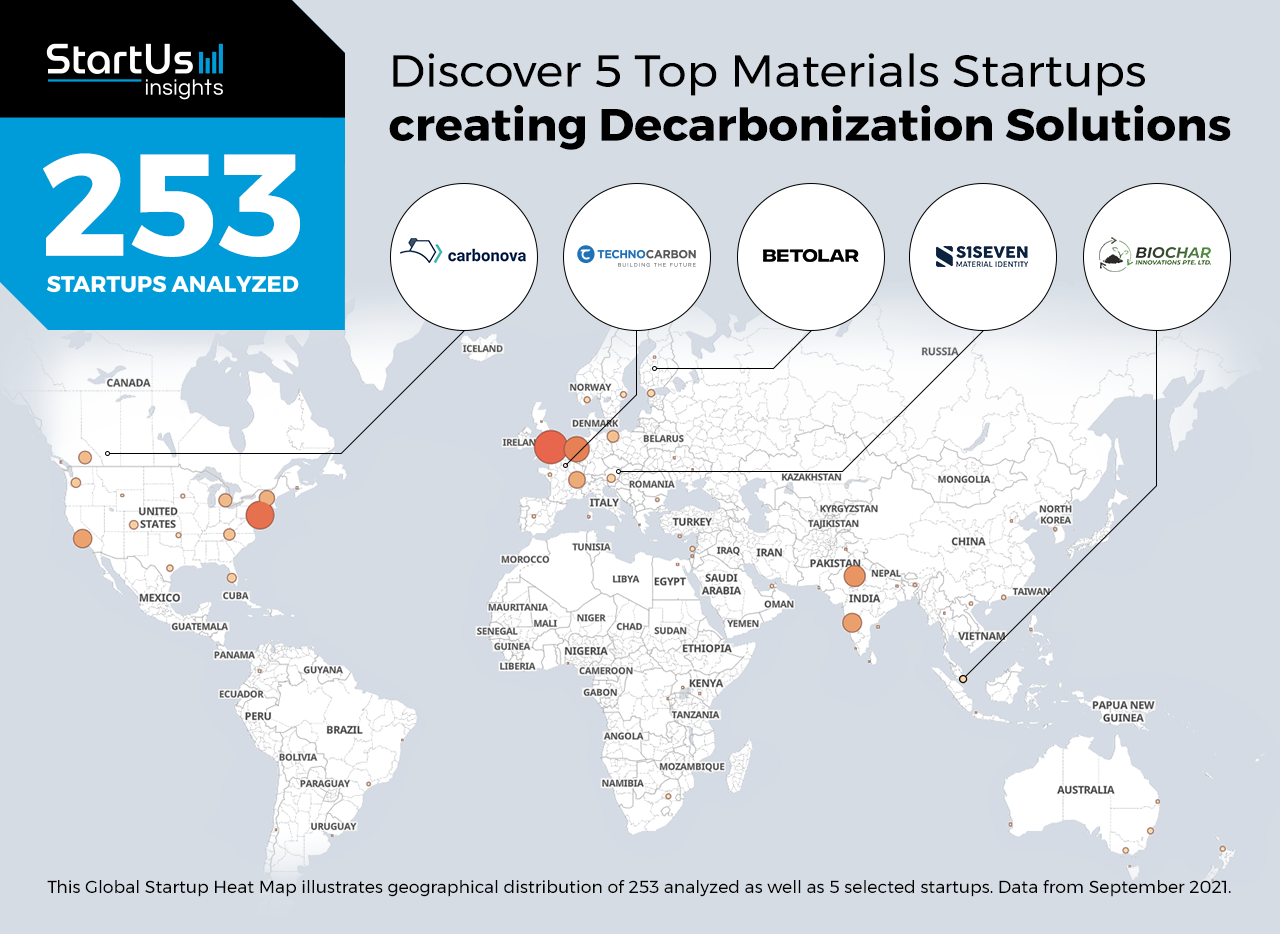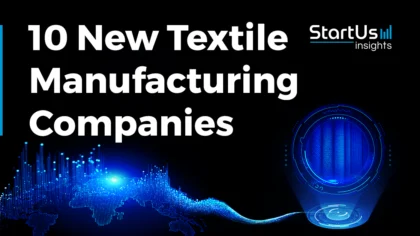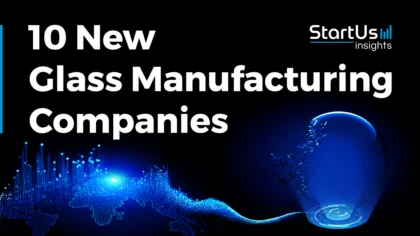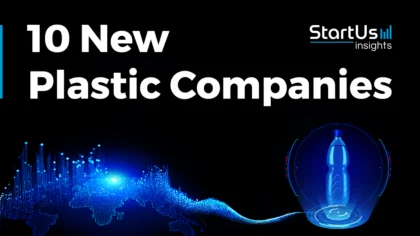Staying ahead of the technology curve means strengthening your competitive advantage. That is why we give you data-driven innovation insights into the materials industry. This time, you get to discover 5 hand-picked materials startups creating decarbonization solutions.
Out of 253, the Global Startup Heat Map highlights 5 Top Materials Startups creating Decarbonization Solutions
The insights of this data-driven analysis are derived from the Big Data & Artificial Intelligence-powered StartUs Insights Discovery Platform, covering 2 093 000+ startups & scaleups globally. The platform gives you an exhaustive overview of emerging technologies & relevant startups within a specific field in just a few clicks.
The Global Startup Heat Map below reveals the distribution of the 253 exemplary startups & scaleups we analyzed for this research. Further, it highlights 5 materials startups that we hand-picked based on criteria such as founding year, location, funding raised, and more. You get to explore the solutions of these 5 startups & scaleups in this report. For insights on the other 248 decarbonization solutions for the materials sector, get in touch.
TechnoCarbon provides Low-carbon Composite Materials
The modularity and low development costs of steel and concrete structures make them a popular choice for building modern infrastructure. However, to tackle climate change, there is a need for reducing the carbon footprint of these materials. As decarbonizing the production of concrete and steel increases their cost, startups and scaleups are looking for low-carbon materials that possess the equivalent strength.
TechnoCarbon is a French startup that develops low-carbon composite materials. The startup’s composite is a stone-carbon fiber layered material that cures at a lower temperature relative to other materials like metals or cement. The lower curing temperature reduces energy usage and, hence, enables sustainable manufacturing. The startup’s process allows the replacement of stone with other minerals like glass, ceramics, and recycled materials. This creates new products that are more economical and sustainable for infrastructure development.
Biochar Innovations develops a Biochar-based Concrete Performance Enhancer
Concrete needs certain functional additives to retain strength and water resistance properties. The current performance enhancers for concrete utilize chemicals with complex processes and, therefore, have an impact on the environment. This is why startups and scaleups are developing additive materials that improve the properties of concrete with minimal effects on its surroundings.
Singaporean startup Biochar Innovations produces biochar additives that improve the durability of cementitious building materials. The startup’s biochar elevates the compactness of the cementitious matrix, consisting of cement, fine, and aggregates. The startup’s technology also avoids the problem of early shrinkage cracking by better hydration and moisture redistribution.
S1Seven tracks Material Sustainability Data
From the time of material extraction to the different stages of processing, material companies generate a large amount of data. This includes information about the quality and environmental impact of the materials. The current methods of storing and handling material data are paper-based, making it difficult to coordinate quality and carbon footprint certificates that are critical in achieving decarbonization goals. To address this, startups and scaleups are offering solutions to automate and streamline material data.
S1Seven is an Austrian startup that develops a platform to digitize the quality certificates of materials. The startup’s software uses blockchain technology to handle the material data. Its software stores data as tamper-proof machine-readable records that serve as proof of the sustainability attributes and automates the verification of quality data and processing provenance. The platform, thus, allows manufacturing companies to keep track of carbon mass balancing between feedstocks, final products, and delivery batches for bulk materials.
Betolar produces Low-carbon Cement Alternatives
Cement is one of the most consumed engineering materials in the world, contributing a significant proportion of the emissions in the construction industry. To tackle this, material startups are developing low-carbon alternatives for cement and other building materials. These material solutions lower the carbon footprint by reducing energy consumption and utilizing waste materials.
Finnish startup Betolar offers low-carbon cement alternatives. Geoprime, the startup’s product, replaces certain raw materials with industrial byproducts from energy, steel, paper, pulp, and mining industries as filler components, freeing up storage spaces for efficient utilization. The production process combines the required aggregates with filler and the Geoprime activator to produce a cement-free, sustainable building material.
Carbonova makes Carbon Nanofibers
Nanomaterials provide greater versatility as compared to bulk-form materials with a broad range of applications in energy, electronics, and healthcare. But the manufacturing process of nanomaterials is complex and requires feedstocks that have a significant carbon footprint. To overcome this, startups and scaleups are developing nanotechnology processes that are either carbon neutral or negative.
Canadian startup Carbonova develops technology for the high-volume production of carbon nanofibers. The startup’s production technique utilizes huge amounts of greenhouse gases like carbon dioxide and methane feedstocks and turns them into sustainable nanofibers. It recovers and recycles the excess heat and uses a special catalyst that reduces the energy consumption to decompose carbon dioxide and form carbon nanofiber. This way, the startup recycles greenhouse gases from landfills, biomass, and natural gas reservoirs to produce carbon-negative nano additives.
Discover more Materials Startups
Materials startups such as the examples highlighted in this report focus on biomaterials, bioplastics, and carbon-negative materials. While all of these technologies play a major role in advancing the materials industry, they only represent the tip of the iceberg. To explore more materials technologies, simply get in touch to let us look into your areas of interest. For a more general overview, you can download our free Materials Innovation Report to save your time and improve strategic decision-making.







